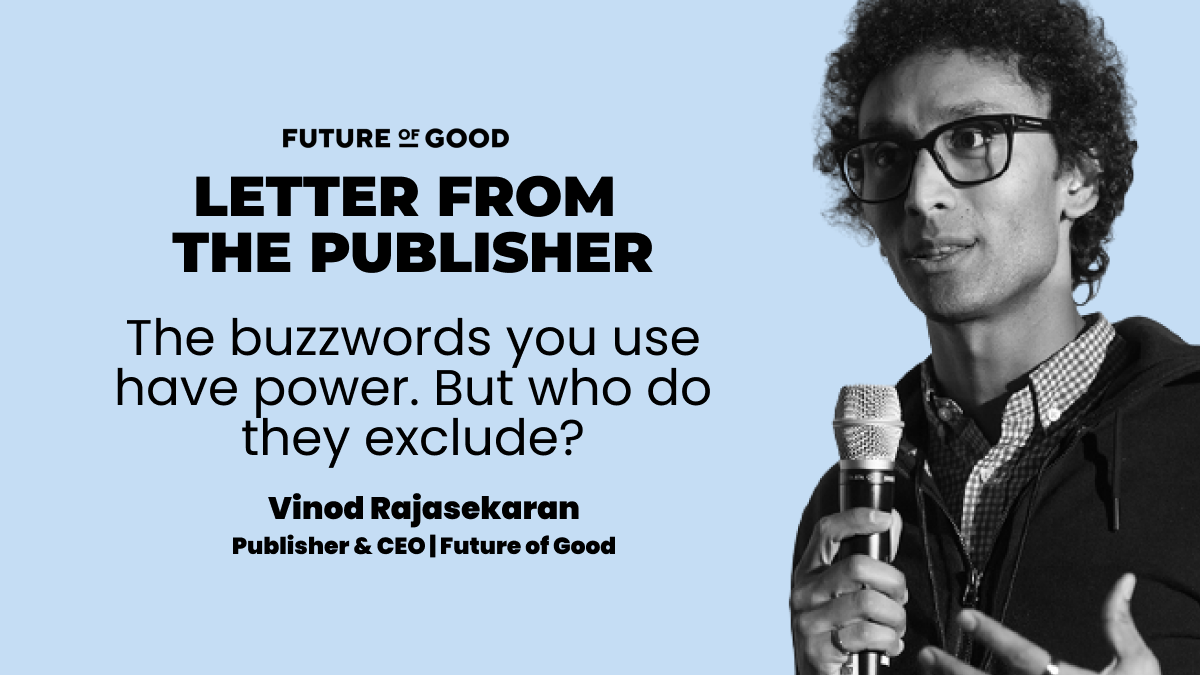The buzzwords you use have power. But who do they exclude?

Names build narratives. Narratives build movements. Think about terms, coined words and slogans that resonate with you — Black Lives Matter, social finance or climate justice. All of these have built narratives, mobilized millions of people, moved millions of dollars, shifted public policy, and changed priorities in leadership and governance tables. In order to realize transformational change in the causes you care about, changemakers must shape new and reshape old narratives that have dominated the social impact world and dominated public discourse.
In the social impact world in particular, narratives are one way either power or scarcity is exercised (or maintained), one way possibilities are shut down or opened up. Narratives determine who’s seen as valuable, acceptable and risky. Our society is nearing the end of a set of narratives that have dominated the western world, dominated the pre-COVID era — and in particular, how social change happens here. The narratives that brought us the social impact world we have today aren’t the narratives that will bring about a flourishing sector tomorrow. The most pressing challenges and injustices society faces today, and the sector’s inability to tackle them substantially, are rooted in outdated narratives that limit our collective ability to understand and accept new and multiple ways of thinking, being, and seeing the world. Thankfully, we are at the beginning of a new narrative for land, policing, international development, prosperity, wealth, giving, work and so much more.
Take climate justice for example: While the scope of the term climate justice is broad, and since its popularization in the 1990s, it has come to encompass the impacts on a variety of groups, including Indigenous peoples, Black and people of colour, women and disabled people. It has also been used to describe objection to the intergenerational injustice of particular generations benefiting from fossil fuel extraction, and leaving young and future peoples to deal with the consequences. As activists and vulnerable people began to mobilize around the term climate justice, the international community watched closely. The world’s first-ever Climate Justice Summit was held in 2000, held at the same time as the COP6 meeting in The Hague, Netherlands. These meetings affirmed that climate change is a rights issue; affecting people’s livelihoods, health, wellbeing, children and the planet’s natural resources. Two years later, an international coalition of social and environmental organizations released the 27 Bali Principles of Climate Justice to “redefine climate change from a human rights and environmental justice perspective”. In the years that followed, academic publications mentioned it, and the field grew exponentially with geographers, anthropologists, policy makers, economists, and sociologists getting involved. Between 2001 and 2021, the mentions of climate justice in mainstream media around the world have quadrupled in volume. Climate justice also has its share of critique and concerns; prominent anthropologists such as Shilpi Srivastava have questioned whose voices are dominating the agenda, conversations and solutions. There are also concerns in the global activist community that as the term and discourse of climate justice has proliferated, the concept has been stripped of its core demands for economic overhaul and redistribution of wealth.
Narratives can mobilize. Narratives have power. Narratives can also exclude, be co-opted, and vanish. On the 20th anniversary of the term cleantech, I sat down with Nicholas Parker, the Canadian who coined it, to learn about how he feels about the term’s journey, what impact it’s had, how the term dismantled a dominant narrative and built a new one, who it excludes, and what advice he has for changemakers when they encounter new terms. It’s a fascinating interview. It’s one of my most cherished conversations this year. I hope you pick up as many insights as I did on how shifting narratives shifts the difference you make everyday.
Vinod Rajasekaran
Publisher & CEO
